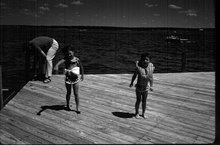
for tom
recorded in her notebook on January 2, 1990:
I do not know why
we can love so hard
and so awkwardly, why now, under the shadow of the locust trees,
the air has turned purple, and the streets--
which are simply returning from rain--
appear permanently stained,
why there is such a thing at all
as loneliness…
--Charlie Smith
New York City, Spring 1987
Let us begin again, twenty years later, because she had fallen in love with a sad lost soul, a historian (or was it literature, or art, or architecture?) dredging through the morphemes of a lost language looking for some memory of himself. He manufactured himself anew each morning, bolstered by the stiff morning light, propped up by syllables, mumbling their sounds like a mantra as he shuffled toward his stuffy office in the history department on Washington Square. She is walking down a quiet Brooklyn sidewalk. Unlike other sidewalks, it is paved with flagstones beneath which, over time, the earth has shifted, so that now, as the heel of her boot strikes the surface of the stone, a clear sound rings out. She is unaware that this sound changes the tissue of the air around her--that time cringes uneasily and recoils from its standard procession. She does not yet know that hope ripples outward upon the waves of this sound, permeating the air around her and the ancient bricks of the row-houses that line the sleeping street.
Before I built a wall I’d ask to know
What I was walling in or walling out…
Something there is that doesn’t love a wall
That wants it down
He had inscribed a quote from Rilke inside the cover of The Last Temptation of Christ: “For one human being to love another--that is perhaps the most difficult of all our tasks, the ultimate, the last test and proof, the work for which all other work is but preparation.” He was not a dream, but a man she had dreamed years before, who had poured into her open hand several lovely stones. Twenty years later she knows the names of the stones: Merton, and Teilhard de Chardin, and Rilke, among others. Kazantzakis was the stone that introduced her to the struggle in which every man partakes: My principal anguish and the source of all my joys and sorrows from youth onward has been the incessant, merciless battle between the spirit and the flesh. She was twenty; he was almost fifty, but he often irritated her by saying he could not wait to know her when she was forty.
In 1990 she will be given a lovely, blank book by her best friend, whom she has betrayed or soon will betray, at the expense of the most tender friendship she will ever know, and will begin writing poetry. It is awful. We must endure this poetry for six or seven months before she abandons poetry for cooking. A dreadful poem about her mother is followed by a recipe for tabouli, then vegetable stroganoff, and ratatouille.
Then, somewhere in my dreams
A fog-torn place and funneled silence
By 1991, a week before her birthday, he will be dead. Shot in the heart. A self-inflicted wound, and suicide becomes the language of love, the last mumbled syllable of a man who existed out of time. In the last months of his life, even she had dismissed his lack of consonance with the world of the living. She hardly noticed the glistening stones, and they kept tumbling into her hands, passed on often by regretful emissaries.
He died on March 4th
With spring snow on the ground
Alone in his pavilion. Seated at the foot of his bed.
Holding his shoe.
His body did not burst into unforgettable fragments at his death, no.
In 1996, the recipes will temporarily cease. She will quote Meister Eckhart and Herman Melville, and make pithy evaluations about the last six years, followed shortly thereafter by an unhappy marriage and two recipes: aduki bean squash stew and Italian Riboletta, the latter being of excellent literary quality.
(She misses him. He had this way of seeing her in her faults, and shaking his head with so much love, saying, "Aw, sweetheart." And she is forty now. She knows who the woman is that he wanted to know. She would have liked to know him, too, at seventy. There were so many stones. She never thanked him for the stones.)
If nature will not tell the tale
Jehovah told to her
Can human nature not survive
Without a listener?
(quotes above are from Robert Frost, Nikos Kazanzakis, Celia Thaxter, Anne Carson, Emily Dickinson)



